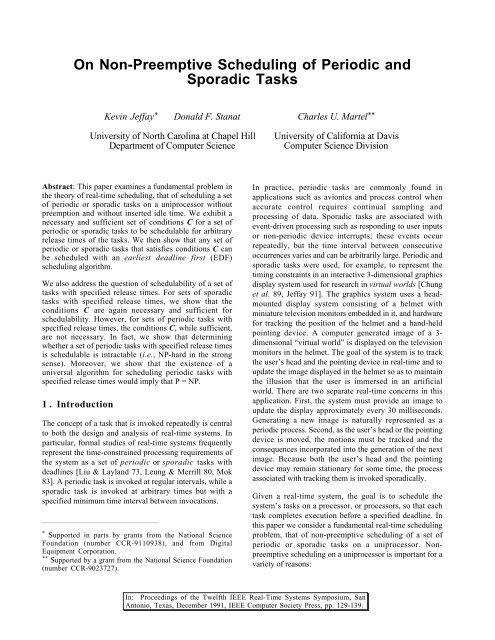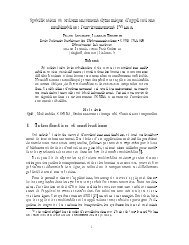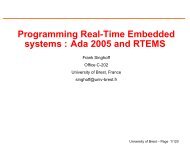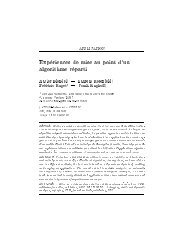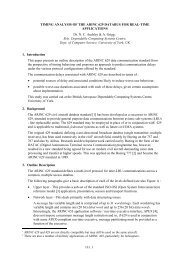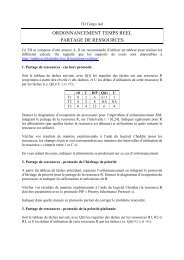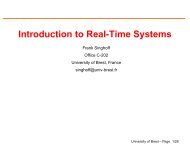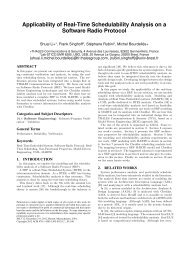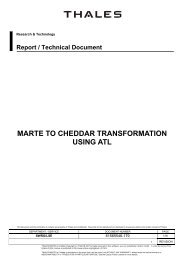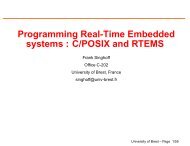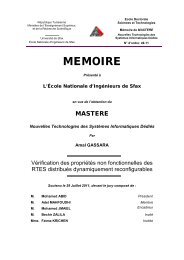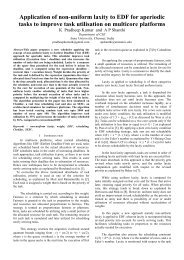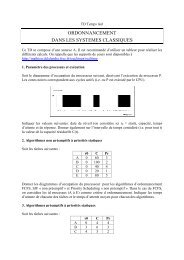On Non-Preemptive Scheduling of Periodic and Sporadic Tasks
On Non-Preemptive Scheduling of Periodic and Sporadic Tasks
On Non-Preemptive Scheduling of Periodic and Sporadic Tasks
Create successful ePaper yourself
Turn your PDF publications into a flip-book with our unique Google optimized e-Paper software.
<strong>On</strong> <strong>Non</strong>-<strong>Preemptive</strong> <strong>Scheduling</strong> <strong>of</strong> <strong>Periodic</strong> <strong>and</strong><br />
<strong>Sporadic</strong> <strong>Tasks</strong><br />
Kevin Jeffay * Donald F. Stanat<br />
University <strong>of</strong> North Carolina at Chapel Hill<br />
Department <strong>of</strong> Computer Science<br />
Charles U. Martel **<br />
University <strong>of</strong> California at Davis<br />
Computer Science Division<br />
Abstract: This paper examines a fundamental problem in<br />
the theory <strong>of</strong> real-time scheduling, that <strong>of</strong> scheduling a set<br />
<strong>of</strong> periodic or sporadic tasks on a uniprocessor without<br />
preemption <strong>and</strong> without inserted idle time. We exhibit a<br />
necessary <strong>and</strong> sufficient set <strong>of</strong> conditions C for a set <strong>of</strong><br />
periodic or sporadic tasks to be schedulable for arbitrary<br />
release times <strong>of</strong> the tasks. We then show that any set <strong>of</strong><br />
periodic or sporadic tasks that satisfies conditions C can<br />
be scheduled with an earliest deadline first (EDF)<br />
scheduling algorithm.<br />
We also address the question <strong>of</strong> schedulability <strong>of</strong> a set <strong>of</strong><br />
tasks with specified release times. For sets <strong>of</strong> sporadic<br />
tasks with specified release times, we show that the<br />
conditions C are again necessary <strong>and</strong> sufficient for<br />
schedulability. However, for sets <strong>of</strong> periodic tasks with<br />
specified release times, the conditions C, while sufficient,<br />
are not necessary. In fact, we show that determining<br />
whether a set <strong>of</strong> periodic tasks with specified release times<br />
is schedulable is intractable (i.e., NP-hard in the strong<br />
sense). Moreover, we show that the existence <strong>of</strong> a<br />
universal algorithm for scheduling periodic tasks with<br />
specified release times would imply that P = NP.<br />
1. Introduction<br />
The concept <strong>of</strong> a task that is invoked repeatedly is central<br />
to both the design <strong>and</strong> analysis <strong>of</strong> real-time systems. In<br />
particular, formal studies <strong>of</strong> real-time systems frequently<br />
represent the time-constrained processing requirements <strong>of</strong><br />
the system as a set <strong>of</strong> periodic or sporadic tasks with<br />
deadlines [Liu & Layl<strong>and</strong> 73, Leung & Merrill 80, Mok<br />
83]. A periodic task is invoked at regular intervals, while a<br />
sporadic task is invoked at arbitrary times but with a<br />
specified minimum time interval between invocations.<br />
* Supported in parts by grants from the National Science<br />
Foundation (number CCR-9110938), <strong>and</strong> from Digital<br />
Equipment Corporation.<br />
** Supported by a grant from the National Science Foundation<br />
(number CCR-9023727).<br />
In practice, periodic tasks are commonly found in<br />
applications such as avionics <strong>and</strong> process control when<br />
accurate control requires continual sampling <strong>and</strong><br />
processing <strong>of</strong> data. <strong>Sporadic</strong> tasks are associated with<br />
event-driven processing such as responding to user inputs<br />
or non-periodic device interrupts; these events occur<br />
repeatedly, but the time interval between consecutive<br />
occurrences varies <strong>and</strong> can be arbitrarily large. <strong>Periodic</strong> <strong>and</strong><br />
sporadic tasks were used, for example, to represent the<br />
timing constraints in an interactive 3-dimensional graphics<br />
display system used for research in virtual worlds [Chung<br />
et al. 89, Jeffay 91]. The graphics system uses a headmounted<br />
display system consisting <strong>of</strong> a helmet with<br />
miniature television monitors embedded in it, <strong>and</strong> hardware<br />
for tracking the position <strong>of</strong> the helmet <strong>and</strong> a h<strong>and</strong>-held<br />
pointing device. A computer generated image <strong>of</strong> a 3-<br />
dimensional “virtual world” is displayed on the television<br />
monitors in the helmet. The goal <strong>of</strong> the system is to track<br />
the user’s head <strong>and</strong> the pointing device in real-time <strong>and</strong> to<br />
update the image displayed in the helmet so as to maintain<br />
the illusion that the user is immersed in an artificial<br />
world. There are two separate real-time concerns in this<br />
application. First, the system must provide an image to<br />
update the display approximately every 30 milliseconds.<br />
Generating a new image is naturally represented as a<br />
periodic process. Second, as the user’s head or the pointing<br />
device is moved, the motions must be tracked <strong>and</strong> the<br />
consequences incorporated into the generation <strong>of</strong> the next<br />
image. Because both the user’s head <strong>and</strong> the pointing<br />
device may remain stationary for some time, the process<br />
associated with tracking them is invoked sporadically.<br />
Given a real-time system, the goal is to schedule the<br />
system’s tasks on a processor, or processors, so that each<br />
task completes execution before a specified deadline. In<br />
this paper we consider a fundamental real-time scheduling<br />
problem, that <strong>of</strong> non-preemptive scheduling <strong>of</strong> a set <strong>of</strong><br />
periodic or sporadic tasks on a uniprocessor. <strong>Non</strong>preemptive<br />
scheduling on a uniprocessor is important for a<br />
variety <strong>of</strong> reasons:<br />
In: Proceedings <strong>of</strong> the Twelfth IEEE Real-Time Systems Symposium, San<br />
Antonio, Texas, December 1991, IEEE Computer Society Press, pp. 129-139.
• In many practical real-time scheduling problems such<br />
as I/O scheduling, properties <strong>of</strong> device hardware <strong>and</strong><br />
s<strong>of</strong>tware either make preemption impossible or<br />
prohibitively expensive.<br />
• <strong>Non</strong>-preemptive scheduling algorithms are easier to<br />
implement than preemptive algorithms, <strong>and</strong> can exhibit<br />
dramatically lower overhead at run-time.<br />
• The overhead <strong>of</strong> preemptive algorithms is more<br />
difficult to characterize <strong>and</strong> predict than that <strong>of</strong> nonpreemptive<br />
algorithms. Since scheduling overhead is<br />
<strong>of</strong>ten ignored in scheduling models (including ours), an<br />
implementation <strong>of</strong> a non-preemptive scheduler will be<br />
closer to the formal model than an implementation <strong>of</strong> a<br />
preemptive scheduler.<br />
• <strong>Non</strong>-preemptive scheduling on a uni-processor<br />
naturally guarantees exclusive access to shared<br />
resources <strong>and</strong> data, thus eliminating both the need for<br />
synchronization <strong>and</strong> its associated overhead.<br />
• The problem <strong>of</strong> scheduling all tasks without<br />
preemption forms the theoretical basis for more general<br />
tasking models that include shared resources [Jeffay<br />
89b, 90].<br />
Many others have looked at variations <strong>of</strong> this problem;<br />
most describe sufficient conditions for scheduling tasks.<br />
We give necessary <strong>and</strong> sufficient conditions. Furthermore,<br />
we show that a particular algorithm can always be used for<br />
scheduling a large class <strong>of</strong> sets <strong>of</strong> tasks. (We will review<br />
related work in more detail in Section 3.)<br />
The remainder <strong>of</strong> this paper is composed <strong>of</strong> five major<br />
sections. The following section presents our scheduling<br />
model. Section 3 briefly reviews the literature in real-time<br />
scheduling. Section 4 proves the non-preemptive EDF<br />
algorithm is universal for sets <strong>of</strong> tasks, whether they be<br />
periodic or sporadic. Section 5 demonstrates the absence <strong>of</strong><br />
a universal algorithm for periodic tasks with specified<br />
release times <strong>and</strong> proves that the problem <strong>of</strong> deciding<br />
schedulability <strong>of</strong> a set <strong>of</strong> concrete periodic tasks is<br />
intractable. Section 6 discusses these results.<br />
2. The Model<br />
A task is a sequential program that is invoked by each<br />
occurrence <strong>of</strong> a particular event. An event is a stimulus<br />
generated by a process that is either external to the system<br />
(e.g., interrupts from a device) or internal to the system<br />
(e.g., clock ticks). We assume that events are generated<br />
repeatedly with some maximum frequency; thus, the time<br />
interval between successive invocations <strong>of</strong> a task will be<br />
<strong>of</strong> some minimal length. Each invocation <strong>of</strong> a task results<br />
in a single execution <strong>of</strong> the task at a time specified by a<br />
scheduling algorithm.<br />
Formally, a task T is a pair (c, p) where<br />
• c is the computational cost: the maximum amount <strong>of</strong><br />
processor time required to execute (the sequential<br />
program <strong>of</strong>) task T to completion on a dedicated<br />
uniprocessor, <strong>and</strong><br />
• p is the period: the minimal interval between<br />
invocations <strong>of</strong> task T.<br />
Throughout this paper we assume time is discrete <strong>and</strong><br />
clock ticks are indexed by the natural numbers. Task<br />
invocations occur <strong>and</strong> task executions begin at clock ticks;<br />
each <strong>of</strong> the parameters c <strong>and</strong> p is expressed as a multiple <strong>of</strong><br />
(the interval between) clock ticks. If a task with cost c<br />
begins execution at time t <strong>and</strong> is executed without<br />
interruption on a uniprocessor, then the execution is<br />
completed at time t + c.<br />
We consider two paradigms <strong>of</strong> task invocation: periodic<br />
<strong>and</strong> sporadic. If T is periodic, the period p specifies a<br />
constant interval between invocations. If T is sporadic, p<br />
specifies a minimum interval between invocations.<br />
The definition <strong>of</strong> the behavior <strong>of</strong> a task depends on<br />
whether it is periodic or sporadic. The behavior <strong>of</strong> a<br />
periodic task T = (c, p) is given by the following rules<br />
for the invocation <strong>and</strong> execution <strong>of</strong> T. If t k is the time <strong>of</strong><br />
the k th invocation <strong>of</strong> task T, then<br />
i) The (k+1) th invocation <strong>of</strong> task T will occur at time<br />
t k+1 = t k + p.<br />
ii) The k th execution <strong>of</strong> task T must begin no earlier than<br />
t k <strong>and</strong> be completed no later than the deadline <strong>of</strong> t k + p.<br />
This requires that c units <strong>of</strong> processor time be allocated<br />
to the execution <strong>of</strong> T in the interval [t k , t k + p].<br />
The behavior <strong>of</strong> a sporadic task is slightly less constrained<br />
than that <strong>of</strong> a periodic task. The behavior <strong>of</strong> a<br />
sporadic task T = (c, p) is given by the following rules<br />
for the invocation <strong>and</strong> execution <strong>of</strong> T. If t k is the time <strong>of</strong><br />
the k th invocation <strong>of</strong> task T, then<br />
i) The (k+1) th invocation <strong>of</strong> T will occur no earlier than<br />
time t k + p; thus, t k+1 ≥ t k + p.<br />
ii) The k th execution <strong>of</strong> task T must begin no earlier than<br />
t k <strong>and</strong> be completed no later than the deadline <strong>of</strong> t k + p.<br />
Thus the behaviors <strong>of</strong> periodic <strong>and</strong> sporadic tasks differ<br />
only in the first rule. We assume invocations <strong>of</strong> sporadic<br />
tasks are independent in the sense that the time a sporadic<br />
task is invoked depends only upon the time <strong>of</strong> its last<br />
invocation <strong>and</strong> not upon the invocation times <strong>of</strong> any other<br />
task.<br />
2
Note that the worst case behavior <strong>of</strong> a sporadic task T =<br />
(c, p) (“worst” in the sense <strong>of</strong> requiring the most processor<br />
time), occurs when T behaves like a periodic task, that is,<br />
T is invoked every p time steps.<br />
We wish to investigate the scheduling <strong>of</strong> sets <strong>of</strong> tasks that<br />
compete for processing resources. The difficulty <strong>of</strong><br />
scheduling tasks can be affected by the times that tasks are<br />
first invoked. A concrete task is a pair (T, R), where T<br />
is a task, <strong>and</strong> R is a non-negative integer that is the time<br />
<strong>of</strong> the first invocation, or the release time, <strong>of</strong> T. The<br />
behavior <strong>of</strong> (T, R) is the behavior <strong>of</strong> T constrained<br />
further by the rule that the first invocation <strong>of</strong> T occurs at<br />
time R. <strong>On</strong>ce released, tasks are invoked repeatedly<br />
forever.<br />
A set <strong>of</strong> periodic (sporadic) tasks τ = {T 1 , T 2 , ...,<br />
T n } is a set <strong>of</strong> tasks indexed from 1 to n, where for each i,<br />
1 ≤ i ≤ n, T i = (c i , p i ). A concrete set <strong>of</strong> periodic<br />
(sporadic) tasks ω = {(T 1 ,R 1 ), (T 2 ,R 2 ) ..., (T n ,R n )} is a<br />
set <strong>of</strong> concrete tasks indexed from 1 to n, where R i is the<br />
release time <strong>of</strong> task T i . 1 There is a natural many-to-one<br />
relation between concrete tasks <strong>and</strong> tasks. We say the task<br />
T generates a concrete task (T, R) <strong>and</strong> a concrete task (T,<br />
R) is generated from the task T. This relation extends<br />
naturally to a relation between concrete task sets <strong>and</strong> task<br />
sets. Let τ = {T 1 , T 2 , ..., T n } be a task set <strong>and</strong> let ω =<br />
{(T 1 ,R 1 ), (T 2 ,R 2 ) ..., (T n ,R n )} be a concrete task set. Then<br />
the task set τ generates the concrete task set ω <strong>and</strong> ω is<br />
generated from τ.<br />
If an execution <strong>of</strong> a task has a deadline <strong>of</strong> time t d , <strong>and</strong><br />
execution is not complete at time t d , then we say the task<br />
has missed a deadline. A scheduling algorithm<br />
specifies, at each time t, which task if any shall begin,<br />
continue, or resume execution. A concrete task set ω is<br />
schedulable if it is possible to schedule the executions<br />
<strong>of</strong> tasks <strong>of</strong> ω so that no task ever misses a deadline when<br />
tasks are released at their specified release times. A task set<br />
τ is schedulable if every concrete task set ω generated<br />
from τ is schedulable. A scheduling algorithm schedules<br />
a concrete task set ω if no task <strong>of</strong> ω ever misses a deadline<br />
when the algorithm is applied.<br />
In this paper, we restrict ourselves to the case <strong>of</strong> nonpreemptive<br />
scheduling on a uniprocessor; that is, we<br />
assume a scheduling algorithm that does not interrupt the<br />
execution <strong>of</strong> any task once it has begun. We also restrict<br />
1 More properly, τ <strong>and</strong> ω are multisets since there can exist<br />
more than one task in τ with the same cost <strong>and</strong> period <strong>and</strong><br />
more than one task in ω with the same cost, period, <strong>and</strong><br />
release time.<br />
ourselves to scheduling on a uniprocessor without inserted<br />
idle time; which means that the scheduling algorithm does<br />
not permit the processor to be idle if there is a task that<br />
has been invoked but has not completed execution. To<br />
save space <strong>and</strong> avoid tedium, we will not mention these<br />
restrictions in the remainder <strong>of</strong> the paper.<br />
Note that a task set is schedulable if <strong>and</strong> only if the tasks<br />
can be scheduled for any set <strong>of</strong> release times. In contrast,<br />
each member <strong>of</strong> a concrete task set has a specified release<br />
time, <strong>and</strong> showing that a concrete task set is schedulable<br />
only establishes that its specified release times can be<br />
accommodated. For example, under the restrictions <strong>of</strong> no<br />
preemption <strong>and</strong> no inserted idle time, a periodic task set<br />
that is not schedulable may generate sets <strong>of</strong> concrete tasks<br />
that are schedulable as well as sets which are not. For<br />
example, the set <strong>of</strong> two periodic tasks τ = {(3, 5), (4, 10)}<br />
generates both schedulable <strong>and</strong> unschedulable concrete task<br />
sets: the set consisting <strong>of</strong> ω' = {((3,5), 0), ((4,10), 0)} is<br />
schedulable but the set consisting <strong>of</strong> ω" = {((3,5), 1),<br />
((4,10), 0)} is not.<br />
A scheduling algorithm is said to be universal for<br />
concrete periodic (sporadic) tasks if the algorithm<br />
schedules every schedulable set <strong>of</strong> concrete periodic<br />
(sporadic) tasks. A scheduling algorithm is said to be<br />
universal for periodic (sporadic) tasks if the<br />
algorithm schedules any concrete periodic (sporadic) task<br />
set generated from a set <strong>of</strong> schedulable tasks. We will<br />
show that a deadline-driven scheduling algorithm that is a<br />
non-preemptive version <strong>of</strong> the earliest deadline first (EDF)<br />
algorithm [Liu & Layl<strong>and</strong> 73], is universal for either<br />
periodic or sporadic tasks as well as for concrete sporadic<br />
tasks. For concrete periodic tasks, however, things are<br />
more complex. If a set <strong>of</strong> concrete periodic tasks ω is<br />
generated from a periodic task set τ that is schedulable,<br />
then ω is schedulable (<strong>and</strong> indeed can be scheduled by the<br />
EDF algorithm). But if τ is not schedulable, then ω may<br />
or not be schedulable. In the general case, we show that<br />
determining whether ω is schedulable is NP-hard in the<br />
strong sense. Moreover, we establish that if there exists a<br />
universal scheduling algorithm for concrete periodic tasks<br />
that takes only a polynomial amount <strong>of</strong> time to make each<br />
scheduling decision, then P = NP. Thus it is unlikely that<br />
there exists a universal algorithm for scheduling concrete<br />
periodic tasks.<br />
3. Previous Work<br />
Previous work in the area <strong>of</strong> real-time scheduling has<br />
mainly focused on the analysis <strong>of</strong> preemptive scheduling<br />
algorithms. A well-known result is that the preemptive<br />
3
EDF algorithm is universal for all sets <strong>of</strong> concrete periodic<br />
tasks for which the release times are all 0 [Liu & Layl<strong>and</strong><br />
73]. This result generalizes to all periodic task sets (i.e.,<br />
for concrete periodic tasks with arbitrary release times)<br />
[Jeffay 89a]. The extension <strong>of</strong> the preemptive problem to<br />
multiprocessors was considered in [Dhall & Liu 78] <strong>and</strong><br />
[Bertossi & Bonuccelli 83].<br />
Work with non-preemptive scheduling algorithms has<br />
typically been confined to consideration <strong>of</strong> models where<br />
processes are invoked only once, there is a precedence order<br />
between the processes, <strong>and</strong> each process requires only a<br />
single unit <strong>of</strong> computation time <strong>and</strong> must be completed<br />
before a deadline [Garey et al. 81, Frederickson 83].<br />
A more general characterization <strong>of</strong> periodic tasks has been<br />
considered in [Leung & Merrill 80], [Lawler & Martel 81],<br />
[Leung & Whitehead 82], <strong>and</strong> [Mok 83]. In these works,<br />
when a task is invoked, it may have a deadline nearer than<br />
the time <strong>of</strong> the next task invocation. For this more general<br />
model, Mok has shown that the problem <strong>of</strong> deciding<br />
schedulability <strong>of</strong> a set <strong>of</strong> periodic tasks which use<br />
semaphores to enforce mutual exclusion constraints is NPhard<br />
[Mok 83]. Our paper demonstrates the intractability<br />
<strong>of</strong> deciding schedulability for an even simpler characterization<br />
<strong>of</strong> periodic tasks <strong>and</strong> additionally provides strong<br />
evidence that there may not exist a universal nonpreemptive<br />
scheduling algorithm for periodic tasks with<br />
specified release times.<br />
4. <strong>Non</strong>-<strong>Preemptive</strong> <strong>Scheduling</strong> <strong>of</strong><br />
<strong>Periodic</strong> <strong>and</strong> <strong>Sporadic</strong> <strong>Tasks</strong><br />
We first consider the problem <strong>of</strong> scheduling a set <strong>of</strong><br />
periodic or sporadic tasks non-preemptively on a single<br />
processor. We begin by developing a set <strong>of</strong> relations on<br />
the costs <strong>and</strong> periods <strong>of</strong> tasks that must hold if a task set<br />
is to be schedulable. If the elements <strong>of</strong> a task set do not<br />
satisfy these relationships then no scheduling algorithm<br />
can schedule the tasks. We show that periodic <strong>and</strong> sporadic<br />
task sets have the same requirements for schedulability.<br />
Having identified necessary conditions for schedulability,<br />
we then exhibit an algorithm which schedules any set <strong>of</strong><br />
periodic or sporadic tasks that satisfy the necessity<br />
conditions. This establishes directly that the algorithm is<br />
universal for scheduling sets <strong>of</strong> tasks <strong>and</strong> proves that the<br />
necessary conditions are also sufficient.<br />
The following theorem establishes necessary conditions<br />
for schedulability for a periodic task set. Our development<br />
<strong>of</strong> these conditions is motivated by the early work <strong>of</strong><br />
Sorenson [Sorenson 74, Sorenson & Hamacher 75].<br />
Theorem 4.1: Let τ p = {T 1 , T 2 , ..., T n }, where T i = (c i ,<br />
p i ), be a set <strong>of</strong> periodic tasks sorted in non-decreasing order<br />
by period (i.e., for any pair <strong>of</strong> tasks T i <strong>and</strong> T j , if i > j,<br />
then p i ≥ p j ). If τ p is schedulable then<br />
n c i<br />
1) ∑ ≤ 1,<br />
i=1 p i<br />
2) ∀i, 1 < i ≤ n; ∀L, p 1 < L < p i :<br />
i–1<br />
L ≥ c i + ∑<br />
j=1<br />
⎣ L ¡<br />
p j<br />
⎦ c j .<br />
Informally, condition (1) can be thought <strong>of</strong> as a<br />
requirement that the processor not be overloaded. If a<br />
periodic task T has a cost c <strong>and</strong> period p, then c/p is the<br />
fraction <strong>of</strong> processor time consumed by T over the lifetime<br />
<strong>of</strong> the system (i.e., the utilization <strong>of</strong> the processor by T).<br />
The first condition simply stipulates that the cumulative<br />
processor utilization cannot exceed unity; reflecting our<br />
restriction to a uniprocessor. 2<br />
Condition (2) reflects our restriction to non-preemptive<br />
scheduling without inserted idle time. The right h<strong>and</strong> side<br />
<strong>of</strong> the inequality in condition (2) is a least upper bound on<br />
the processor dem<strong>and</strong> that can be realized in an interval <strong>of</strong><br />
length L starting at the time an invocation <strong>of</strong> a task T i is<br />
scheduled, <strong>and</strong> ending sometime before the deadline for the<br />
invocation. For a set <strong>of</strong> tasks to be schedulable, the<br />
dem<strong>and</strong> in the interval L must always be less than or equal<br />
to the length <strong>of</strong> the interval. Although this is semantically<br />
similar to the requirement that the processor not be overutilized,<br />
it can easily be shown that conditions (1) <strong>and</strong> (2)<br />
are in fact not related. It is possible to conceive <strong>of</strong> both<br />
schedulable task sets that have a processor utilization <strong>of</strong><br />
1.0, <strong>and</strong> unschedulable task sets that have arbitrarily small<br />
processor utilization.<br />
Pro<strong>of</strong>: We prove the contrapositive <strong>of</strong> the Theorem: if a<br />
set <strong>of</strong> periodic tasks τ p does not satisfy condition (1) or<br />
condition (2) then there exists a concrete set <strong>of</strong> periodic<br />
tasks, generated from τ p that is not schedulable.<br />
For a concrete set <strong>of</strong> tasks ω, define the processor dem<strong>and</strong><br />
in the time interval [a, b], written d a,b , as the maximum<br />
amount <strong>of</strong> processing time required by ω in the interval<br />
[a, b] to complete execution <strong>of</strong> all invocations <strong>of</strong> tasks<br />
with deadlines in the interval [a, b]. The processor dem<strong>and</strong><br />
2 In [Liu & Layl<strong>and</strong> 73] it was shown that a concrete set <strong>of</strong><br />
periodic tasks ω p = {(T 1 ,R 1 ), (T 2 ,R 2 ), ..., (T n ,R n ), } where<br />
R i = 0 for all i (i.e., all tasks are released at time 0), is<br />
schedulable on a uniprocessor when preemption is allowed at<br />
arbitrary points in time if <strong>and</strong> only if condition (1) alone is<br />
satisfied.<br />
4
in the interval [a, b] will be a function <strong>of</strong> costs <strong>and</strong> periods<br />
<strong>of</strong> the tasks in ω, the length <strong>of</strong> the interval, the invocation<br />
times <strong>of</strong> tasks prior to or at time a, <strong>and</strong> the amount <strong>of</strong><br />
computation time required to complete execution <strong>of</strong> task<br />
invocations that occurred prior to time a with deadlines at<br />
or before time b that have not completed execution by<br />
time a. ω is schedulable if <strong>and</strong> only if for all intervals<br />
[a, b], d a,b ≤ b – a.<br />
Consider the concrete set <strong>of</strong> periodic tasks ω p = {(T 1 ,R 1 ),<br />
(T 2 ,R 2 ), ..., (T n ,R n )}, generated from τ p where R i = 0 for<br />
all i, 1 ≤ i ≤ n (i.e., the concrete set <strong>of</strong> tasks wherein all<br />
tasks are released at time 0). Let t = p 1 p 2 … p n . In the<br />
interval [0,t], task i must receive t p i<br />
c i units <strong>of</strong> processor<br />
time to ensure it does not miss a deadline in the interval<br />
[0, t]. Therefore, in the interval [0, t]<br />
d 0,t = ∑ n t<br />
c<br />
i=1 p i ,<br />
i<br />
<strong>and</strong> hence<br />
d 0,t<br />
t<br />
n c i<br />
= ∑ .<br />
i=1 p i<br />
If condition (1) does not hold then d 0,t > t, <strong>and</strong> hence ω p is<br />
not schedulable.<br />
For condition (2), consider the concrete set <strong>of</strong> periodic<br />
tasks ω p = {(T 1 ,R 1 ), (T 2 ,R 2 ), ..., (T n ,R n )} generated from<br />
τ p , where for some value <strong>of</strong> i, 1 < i ≤ n, R i = 0, <strong>and</strong> R j =<br />
1 for 1 ≤ j ≤ n, j ≠ i. This gives rise to the pattern <strong>of</strong> task<br />
invocations shown in Figure 4.1. Since neither<br />
preemption nor inserted idle time are allowed, task T i must<br />
execute in the interval [0, c i ]. For all L, p 1 < L < p i , in<br />
the interval [0, L], the processor dem<strong>and</strong>, d 0,L , is given by<br />
i–1<br />
d 0,L = c i + ∑<br />
j=1<br />
⎣ –1<br />
p j<br />
⎦ c j .<br />
The dem<strong>and</strong> consists <strong>of</strong> the cost <strong>of</strong> executing the initial<br />
invocation <strong>of</strong> task T i plus the processor dem<strong>and</strong> due to<br />
tasks 1 through i–1 in the interval [1, L]. (Note that tasks<br />
with periods greater than or equal to p i have no<br />
invocations with deadlines in the interval [0, L] <strong>and</strong> hence<br />
do not contribute to the processor dem<strong>and</strong> in the interval<br />
[0, L].)<br />
If condition (2) does not hold then d 0,L > L, <strong>and</strong> hence ω p<br />
is not schedulable.<br />
Conditions (1) <strong>and</strong> (2) from Theorem 4.1 are also<br />
necessary for scheduling a set <strong>of</strong> sporadic tasks nonpreemptively.<br />
Corollary 4.2: If a set <strong>of</strong> sporadic tasks τ s = {T 1 , T 2 ,<br />
..., T n }, sorted in non-decreasing order by period, is<br />
T 1<br />
T 2<br />
:<br />
:<br />
T i–1<br />
T i<br />
T i+1<br />
:<br />
:<br />
T n<br />
Time<br />
0 1 c i p i<br />
Figure 4.1<br />
schedulable then τ s satisfies conditions (1) <strong>and</strong> (2) from<br />
Theorem 4.1.<br />
Pro<strong>of</strong>: This can be proved independently <strong>of</strong> Theorem 4.1,<br />
however, it follows from Theorem 4.1 using the fact that<br />
one <strong>of</strong> the behaviors <strong>of</strong> a concrete set <strong>of</strong> sporadic tasks is<br />
as a concrete set <strong>of</strong> periodic tasks.<br />
The constructions used in the pro<strong>of</strong> <strong>of</strong> Theorem 4.1, in<br />
fact, precisely characterize the worst case pattern <strong>of</strong> task<br />
invocations for any set <strong>of</strong> tasks. We will show that if a set<br />
<strong>of</strong> tasks can be scheduled (without preemption) when<br />
invoked as shown in Figure 4.1, then the tasks are indeed<br />
schedulable. Specifically, we demonstrate the existence <strong>of</strong><br />
a non-preemptive scheduling algorithm which is<br />
guaranteed to schedule any periodic or sporadic task set<br />
that satisfies the necessity conditions.<br />
The basic scheduling algorithm we consider is the earliest<br />
deadline first (EDF) algorithm [Liu & Layl<strong>and</strong> 73]. When<br />
selecting a task for execution, an EDF scheduling<br />
algorithm chooses the task with an uncompleted<br />
invocation with the earliest deadline. Ties between tasks<br />
with identical deadlines are broken arbitrarily. With a nonpreemptive<br />
formulation <strong>of</strong> the EDF algorithm, once a task<br />
is selected, the task is immediately executed to<br />
completion. Unless the processor is idle, such a scheduler<br />
will make dispatching decisions only when a task<br />
terminates an execution. If the processor is idle then the<br />
first task to be invoked is scheduled. If multiple tasks are<br />
invoked simultaneously then the one with the nearest<br />
deadline is scheduled. We assume that both the task<br />
selection process <strong>and</strong> the process <strong>of</strong> dispatching a task take<br />
no time in our discrete time system.<br />
We next demonstrate the universality <strong>of</strong> the EDF<br />
algorithm for scheduling sporadic tasks without<br />
preemption. This means if any non-preemptive algorithm<br />
schedules a set <strong>of</strong> sporadic tasks, then the EDF algorithm<br />
...<br />
...<br />
...<br />
...<br />
...<br />
...<br />
5
will as well. To prove universality, it suffices to show<br />
that conditions (1) <strong>and</strong> (2) are sufficient to ensure that the<br />
EDF algorithm schedules any concrete set <strong>of</strong> sporadic<br />
tasks generated from a set <strong>of</strong> schedulable sporadic tasks.<br />
Theorem 4.3: Let τ s be a set <strong>of</strong> sporadic tasks {(c 1 , p 1 ),<br />
(c 2 , p 2 ), ..., (c n , p n )} sorted in non-decreasing order by<br />
period. If τ s satisfies conditions (1) <strong>and</strong> (2) from Theorem<br />
4.1 then the non-preemptive EDF scheduling algorithm<br />
will schedule any concrete set <strong>of</strong> sporadic tasks generated<br />
from τ s .<br />
Pro<strong>of</strong>: By contradiction. Assume the contrary, i.e., that<br />
τ s satisfies conditions (1) <strong>and</strong> (2) from Theorem 4.1 <strong>and</strong><br />
yet there exists a concrete set <strong>of</strong> sporadic tasks ω s<br />
generated from τ s , such that a task in ω s misses a deadline<br />
at some point in time when ω s is scheduled by the EDF<br />
algorithm. The pro<strong>of</strong> proceeds by deriving upper bounds<br />
on the processor dem<strong>and</strong> for an interval ending at the time<br />
at which a task misses a deadline.<br />
Let t d be the earliest point in time at which a deadline is<br />
missed. ω s can be partitioned into three disjoint subsets:<br />
S 1 = the set <strong>of</strong> tasks that have an invocation with a<br />
deadline at time t d ,<br />
S 2 = the set <strong>of</strong> tasks that have an invocation occurring<br />
prior to time t d with deadline after t d , <strong>and</strong><br />
S 3 = the set <strong>of</strong> tasks not in S 1 or S 2 .<br />
<strong>Tasks</strong> in S 3 either have a release time greater than t d , or<br />
they have not been invoked immediately prior to time t d .<br />
As will shortly become apparent, to bound the processor<br />
dem<strong>and</strong> prior to t d , it suffices to concentrate on the tasks<br />
in S 2 . Let b 1 , b 2 , ..., b k be the invocation times<br />
immediately prior to t d <strong>of</strong> the tasks in S 2 . There are two<br />
cases to consider.<br />
Case 1: <strong>Non</strong>e <strong>of</strong> the invocations <strong>of</strong> tasks in S 2 occurring<br />
at times b 1 , b 2 , ..., b k are scheduled prior to t d .<br />
Let t 0 be the end <strong>of</strong> the last period prior to t d in which the<br />
processor was idle. If the processor has never been idle let<br />
t 0 = 0. In the interval [t 0 , t d ], the processor dem<strong>and</strong> is the<br />
total processing requirement <strong>of</strong> the tasks that are invoked<br />
at or after time t 0 , with deadlines at or before time t d . This<br />
gives<br />
n<br />
⎣ t d t 0<br />
p j<br />
⎦ c j .<br />
d t0 ,t d<br />
≤ ∑<br />
j=1<br />
(Equality holds if all tasks are invoked at time t 0 .) Since<br />
there is no idle period in the interval [t 0 , t d ] <strong>and</strong> since a<br />
task misses a deadline at t d , it follows that d t0 ,t d<br />
> t d – t 0 .<br />
Therefore<br />
<strong>and</strong> hence<br />
n<br />
t d – t 0 < ∑<br />
j=1<br />
⎣ t d t 0<br />
p j<br />
⎦ c j ≤ ∑ n t d t 0<br />
c<br />
j=1 p j ,<br />
j<br />
n<br />
c j<br />
1 < ∑ .<br />
j=1 p j<br />
However, this contradicts condition (1) <strong>and</strong> establishes the<br />
theorem for Case 1.<br />
Case 2: Some <strong>of</strong> the invocations <strong>of</strong> tasks in S 2 occurring<br />
at times b 1 , b 2 , ..., b k are scheduled prior to t d .<br />
Let T i be the last task in S 2 scheduled prior to time t d . Let<br />
t i < t d be the point in time at which the invocation <strong>of</strong> T i<br />
occurring immediately prior to t d commences execution.<br />
Note that if the processor is ever idle in the interval [t i ,<br />
t d ], then the analysis <strong>of</strong> Case 1 can be applied directly to<br />
the interval [t 0 , t d ], where t i < t 0 < t d is the end <strong>of</strong> the last<br />
idle period prior to time t d , to reach a contradiction <strong>of</strong><br />
condition (1). Therefore, assume the processor is fully<br />
utilized during the interval [t i , t d ].<br />
Let T k be a task that misses a deadline at time t d . Because<br />
<strong>of</strong> our choice <strong>of</strong> task T i <strong>and</strong> our use <strong>of</strong> EDF scheduling, it<br />
follows that t i < t d – p k . That is, the invocation <strong>of</strong> the<br />
task T k that does not complete execution by time t d occurs<br />
within the interval [t i , t d ]. We now show that if the<br />
invocation in question <strong>of</strong> task T i is scheduled prior to time<br />
t d , then there must have existed enough processor time in<br />
[t i , t d ] to schedule all invocations <strong>of</strong> tasks occurring after<br />
time t i with deadlines at or before time t d . To begin, we<br />
derive an upper bound on d ti ,t d<br />
, the processor dem<strong>and</strong> for<br />
the interval [t i , t d ].<br />
The following facts hold for Case 2:<br />
i) Other than task T i , no task with period greater than<br />
or equal to t d – t i executes in the interval [t i , t d ].<br />
Since the invocation <strong>of</strong> task T i scheduled at time t i has a<br />
deadline after time t d <strong>and</strong> is the last such invocation<br />
scheduled prior to to t d , every other task executed in [t i , t d ]<br />
must have a deadline at or before t d because <strong>of</strong> the EDF<br />
discipline.<br />
ii) Other than task T i , no task which is scheduled in<br />
[t i , t d ] could have been invoked at time t i .<br />
Again, as a consequence <strong>of</strong> the definition <strong>of</strong> task T i , other<br />
than T i , every task scheduled in [t i , t d ] has a deadline at or<br />
before t d . Therefore, if a task T i' , that is scheduled in [t i ,<br />
t d ] had been invoked at t i , the EDF algorithm would have<br />
scheduled task T i' instead <strong>of</strong> task T i at time t i .<br />
6
Since p i > t d – t i , fact (i) above indicates that only tasks<br />
T 1 ... T i need be considered in computing d ti ,t d<br />
. Since the<br />
invocation <strong>of</strong> task T i that is scheduled at time t i has a<br />
deadline after time t d , all task invocations occurring prior<br />
to time t i with deadlines at or before t d must have been<br />
satisfied by t i <strong>and</strong> hence do not contribute to d ti ,t d<br />
.<br />
Similarly, since T i has the last invocation with deadline<br />
after t d that executes prior to t d , all invocations <strong>of</strong> tasks<br />
T 1 - T i–1 occurring prior to time t d with deadlines after t d ,<br />
need not be considered. Lastly, since none <strong>of</strong> the<br />
invocations <strong>of</strong> tasks T 1 - T i–1 that are scheduled in the<br />
interval [t i , t d ] occurred at time t i , the dem<strong>and</strong> due to tasks<br />
T 1 - T i–1 in the interval [t i , t d ] is the same as in the<br />
interval [t i + 1, t d ]. These observations, plus the fact the<br />
invocation <strong>of</strong> task T i scheduled at time t i must be<br />
completed before time t d , indicate that the processor<br />
dem<strong>and</strong> in [t i , t d ] is bounded by<br />
i–1⎣ t d t i ¡<br />
d ti ,t d<br />
≤ c i + ∑<br />
j=1<br />
Let L = t d – t i . Substituting L into the (4.1) yields<br />
i–1⎣ L ¡<br />
¡£¢<br />
p j<br />
⎦ c j . (4.1)<br />
d ti ,t d<br />
≤ c i + ∑<br />
j=1 p j<br />
⎦ c j . (4.2)<br />
Since there is no idle time in [t i , t d ], <strong>and</strong> since a task<br />
missed a deadline at t d , it follows that d ti ,t d<br />
> t d – t i or<br />
simply d ti ,t d<br />
> L. Combining this with (4.2) yields<br />
i–1⎣ L ¡<br />
L < d ti ,t d<br />
≤ c i + ∑<br />
j=1 p j<br />
⎦ c j , (4.3)<br />
Since p i > t d – t i , we have p i > L. Since t i < t d – p k (recall<br />
that k is the index <strong>of</strong> a task that missed a deadline at time<br />
t d ) we have t d – t i > p k ≥ p 1 , <strong>and</strong> hence L > p 1 . Therefore<br />
(4.3) contradicts condition (2) <strong>and</strong> establishes the theorem<br />
for Case 2.<br />
We have shown that in either case, if an element <strong>of</strong> a<br />
concrete set <strong>of</strong> sporadic tasks generated from τ s misses a<br />
deadline when scheduled by the non-preemptive EDF<br />
algorithm, then either condition (1) or condition (2) from<br />
Theorem 4.1 must have been violated. This proves the<br />
theorem.<br />
The following corollary shows that the EDF scheduling<br />
algorithm is universal for scheduling periodic tasks.<br />
Corollary 4.4: Let τ p be a set <strong>of</strong> periodic tasks {(c 1 ,<br />
p 1 ), (c 2 , p 2 ), ..., (c n , p n )} sorted in non-decreasing order<br />
by period. If τ p satisfies conditions (1) <strong>and</strong> (2) from<br />
Theorem 4.1 then the non-preemptive EDF scheduling<br />
algorithm will schedule any concrete set <strong>of</strong> periodic tasks<br />
generated from τ p .<br />
Pro<strong>of</strong>: Recall that one <strong>of</strong> the behaviors <strong>of</strong> a sporadic task<br />
is as a periodic task. Therefore, if conditions (1) <strong>and</strong> (2) are<br />
sufficient to guarantee the non-preemptive EDF algorithm<br />
will schedule a concrete set <strong>of</strong> sporadic tasks, then the<br />
conditions are also sufficient to guarantee the algorithm<br />
will schedule a concrete set <strong>of</strong> periodic tasks.<br />
Since the non-preemptive EDF algorithm is universal for<br />
both periodic <strong>and</strong> sporadic tasks, in order to decide if a set<br />
<strong>of</strong> tasks is schedulable, one need only consider if<br />
conditions (1) <strong>and</strong> (2) from Theorem 4.1 hold. Deciding if<br />
condition (1) holds is straightforward <strong>and</strong> can be performed<br />
in time O(n). A set <strong>of</strong> tasks can be tested against condition<br />
(2) in pseudo-polynomial time O(p n ) by using a dynamic<br />
programming technique [Jeffay 89a]. (Recall that p n is the<br />
period <strong>of</strong> the “largest” task.)<br />
5. <strong>Non</strong>-<strong>Preemptive</strong> <strong>Scheduling</strong> <strong>of</strong><br />
Concrete <strong>Tasks</strong><br />
The non-preemptive EDF algorithm is universal for both<br />
periodic <strong>and</strong> sporadic tasks. In this section we examine the<br />
problem <strong>of</strong> scheduling a concrete set <strong>of</strong> periodic or<br />
sporadic tasks. Recall that a concrete task set consists <strong>of</strong> a<br />
task set together with release times <strong>of</strong> the tasks. For<br />
concrete sporadic tasks we show that the non-preemptive<br />
EDF scheduling algorithm is again universal. However,<br />
for concrete periodic tasks the situation is more complex.<br />
We show that the problem <strong>of</strong> deciding if a concrete set <strong>of</strong><br />
periodic tasks is schedulable for any non-preemptive<br />
scheduling algorithm (including those that allow inserted<br />
idle time) is intractable (i.e., NP-hard in the strong sense).<br />
Moreover, we show that if a universal algorithm exists for<br />
scheduling concrete periodic tasks without preemption<br />
then P = NP.<br />
To begin, we consider scheduling concrete sporadic tasks.<br />
By the definition <strong>of</strong> schedulability, if a set <strong>of</strong> sporadic<br />
tasks τ s is schedulable then any set <strong>of</strong> concrete sporadic<br />
tasks ω s generated from τ s is schedulable. The following<br />
theorem demonstrates that the schedulability <strong>of</strong> a concrete<br />
set <strong>of</strong> sporadic tasks is not a function <strong>of</strong> the assignment <strong>of</strong><br />
release times to tasks.<br />
Theorem 5.1: Let ω s = {(T 1 ,R 1 ), (T 2 ,R 2 ), ..., (T n ,R n )}<br />
be a concrete set <strong>of</strong> sporadic tasks generated from the set <strong>of</strong><br />
sporadic tasks τ s = {T 1 , T 2 , ..., T n }. Then ω s is<br />
schedulable if <strong>and</strong> only if τ s is schedulable.<br />
Pro<strong>of</strong>: (⇒) This follows immediately from the definition<br />
<strong>of</strong> schedulability. (⇐) We must show that if the tasks <strong>of</strong><br />
τ s can be scheduled so as to not miss any deadlines when<br />
the task release times are given by R 1 ...R n , then the same<br />
is true for any other set <strong>of</strong> release times. Suppose this is<br />
7
not the case, that is, for some set <strong>of</strong> release times<br />
R′ 1 ...R′ n , there exists some pattern <strong>of</strong> task invocations for<br />
which some task <strong>of</strong> τ s must miss a deadline. By the<br />
definition <strong>of</strong> the behavior <strong>of</strong> a sporadic task, an arbitrary<br />
time interval may elapse between a task's deadline <strong>and</strong> its<br />
next invocation. Let D be the maximum value <strong>of</strong> R i + p i ,<br />
where p i is the period <strong>of</strong> task T i . Note that all initial<br />
invocations <strong>of</strong> tasks with release times R 1 ...R n are<br />
completed at or prior to D. We can now map the pattern <strong>of</strong><br />
task invocations with release times <strong>of</strong> R′ 1 ...R′ n to a<br />
similar pattern <strong>of</strong> task invocations that begins at time D,<br />
in effect, starting τ s over again with a set <strong>of</strong> “release<br />
times” R′ i + D unrelated to the original release times.<br />
Clearly if some pattern <strong>of</strong> task invocations could force<br />
some task to miss a deadline for release times R′ 1 ...R′ n ,<br />
the same pattern <strong>of</strong> invocations shifted in time by D will<br />
cause some task <strong>of</strong> the concrete task set ω s to miss a<br />
deadline sometime after D. But this contradicts the<br />
hypotheses that ω s is schedulable <strong>and</strong> establishes the<br />
theorem.<br />
Theorem 5.1 shows that the problem <strong>of</strong> scheduling<br />
sporadic tasks is equivalent to the problem <strong>of</strong> scheduling<br />
concrete sporadic tasks. It follows that conditions (1) <strong>and</strong><br />
(2) from Theorem 4.1 are necessary <strong>and</strong> sufficient for<br />
schedulability <strong>of</strong> concrete sporadic task sets. Moreover, the<br />
non-preemptive EDF scheduling algorithm is universal for<br />
these task sets.<br />
Unlike concrete sporadic tasks, schedulability <strong>of</strong> concrete<br />
periodic tasks is a function <strong>of</strong> the assignment <strong>of</strong> release<br />
times. A periodic task set that is not schedulable may<br />
generate sets <strong>of</strong> concrete tasks that are schedulable as well<br />
as sets which are not (an example was given in Section 2).<br />
In order to properly study the problem <strong>of</strong> scheduling<br />
concrete periodic tasks, the definition <strong>of</strong> universality<br />
presented in Section 2 must be refined to include some<br />
notion <strong>of</strong> efficiency. It has been assumed that a scheduling<br />
algorithm can select a task to execute in zero time.<br />
Therefore, a scheduler that enumerated all possible<br />
schedules would be a universal, albeit uninteresting,<br />
scheduler. In addition to scheduling all schedulable sets <strong>of</strong><br />
tasks, a reasonable requirement for a universal scheduling<br />
algorithm is that each scheduling decision be made in time<br />
polynomial in the number <strong>of</strong> tasks. For this refined notion<br />
<strong>of</strong> universality, we will show that if there exists a<br />
universal non-preemptive scheduling discipline for<br />
scheduling concrete periodic tasks then P = NP.<br />
The following theorem shows that the complexity <strong>of</strong><br />
deciding if a set <strong>of</strong> concrete periodic tasks is schedulable<br />
when one is allowed to consider any non-preemptive<br />
scheduling discipline (including those that allow inserted<br />
idle time) is NP-hard in the strong sense. This means that<br />
unless P = NP, a pseudo-polynomial time algorithm does<br />
not exist for deciding this question [Garey & Johnson 79].<br />
This provides strong evidence that the problem is<br />
intractable. This decision problem can be formally stated<br />
as follows.<br />
NON-PREEMPTIVE SCHEDULING OF CONCRETE<br />
PERIODIC TASKS (SCPT): Let τ p = {(c 1 , p 1 ), (c 2 , p 2 ), ...,<br />
(c n , p n )} be a set <strong>of</strong> periodic tasks <strong>and</strong> let ω p = (τ p , ρ) be a<br />
set <strong>of</strong> concrete periodic tasks generated from τ p . Is it<br />
possible to schedule ω p non-preemptively?<br />
Theorem 5.2: NON-PREEMPTIVE SCHEDULING OF<br />
CONCRETE PERIODIC TASKS is NP-hard in the strong<br />
sense.<br />
Pro<strong>of</strong>: We will give a polynomial time transformation<br />
from the 3-PARTITION problem [Garey & Johnson 79] to<br />
SCPT.<br />
An instance <strong>of</strong> the 3-PARTITION problem consists <strong>of</strong> a<br />
finite set A <strong>of</strong> 3m elements, a bound B ∈ Z + , <strong>and</strong> a “size”<br />
s(a) ∈ Z + for each a ∈ A, such that each s(a) satisfies<br />
B/4 < s(a) < B/2, <strong>and</strong> ∑j=1<br />
3m s(a j ) = Bm. The problem is to<br />
determine if A can be partitioned into m disjoint sets S 1 ,<br />
S 2 , ..., S m such that, for 1 ≤ i ≤ m, ∑a∈S i<br />
s(a) = B. (With<br />
the above constraints on the element sizes, note that every<br />
S i will contain exactly three elements from set A.)<br />
The transformation is performed as follows. Let A = {a 1 ,<br />
a 2 , a 3 , ..., a 3m }, B ∈ Z + , <strong>and</strong> s(a 1 ), s(a 2 ), s(a 3 ), ..., s(a 3m )<br />
∈ Z + , constitute an arbitrary instance <strong>of</strong> the 3-PARTITION<br />
problem. We create an instance <strong>of</strong> the SCPT problem by<br />
constructing a set ω p <strong>of</strong> n = 3m + 2 concrete periodic<br />
tasks. Let τ p = {T 1 , T 2 , ..., T 3m+2 }, where (recall T =<br />
(cost, period))<br />
T 1 = ((8B, 20B),<br />
T 2 = ((23B, 40B), <strong>and</strong><br />
∀j, 3 ≤ j ≤ 3m+2: T j = ((s(a j–2 ), 40Bm),<br />
be a set <strong>of</strong> sporadic tasks, <strong>and</strong> let ω p = {(T 1 ,R 1 ), (T 2 ,R 2 ),<br />
..., (T 3m+2 ,R 3m+2 )} where<br />
R 1 = 0,<br />
R 2 = 9B, <strong>and</strong><br />
∀j, 3 ≤ j ≤ 3m+2: R j = 0,<br />
be a set <strong>of</strong> concrete sporadic tasks. The construction <strong>of</strong> the<br />
set ω p can clearly be done in polynomial time with the<br />
largest number created in the new problem instance being<br />
40Bm. In this instance <strong>of</strong> SCPT, note that the processor<br />
utilization is<br />
8
T 1<br />
T 2<br />
B B B<br />
...<br />
...<br />
...<br />
...<br />
...<br />
...<br />
...<br />
T 3<br />
...<br />
...<br />
T 4<br />
T 5<br />
:<br />
T g<br />
...<br />
...<br />
...<br />
...<br />
...<br />
...<br />
T h<br />
T i<br />
T j<br />
T k<br />
...<br />
...<br />
...<br />
...<br />
...<br />
...<br />
...<br />
...<br />
T l:<br />
Time<br />
...<br />
...<br />
...<br />
0 8B 9B 40Bk 40B(k+1) 40B(k+2) 40Bm<br />
9B+40Bk 9B+40B(k+1) 9B+40Bm<br />
...<br />
Figure 5.1<br />
n<br />
∑ =<br />
p j<br />
j=1<br />
c j<br />
8<br />
20 + 23<br />
40 + ∑j=1<br />
3m s(a j )<br />
40Bm<br />
=<br />
39<br />
40 + Bm<br />
40Bm = 1.0 .<br />
By our choice <strong>of</strong> release times for T 1 <strong>and</strong> T 2 , ω p can be<br />
scheduled by a non-preemptive scheduling algorithm only<br />
if T 2 is scheduled at points in time 9B + 40Bk, for all<br />
k ≥ 0, <strong>and</strong> all the invocations <strong>of</strong> T 1 occurring at time<br />
20B + 40Bk, are scheduled at time 40B(k+1) – 8B, for all<br />
k ≥ 0. (See Figure 5.1.) This must be the case since if the<br />
execution <strong>of</strong> the i th invocation <strong>of</strong> T 2 is scheduled at some<br />
time other than 9B + 40B(i–1), then the invocation <strong>of</strong> T 1<br />
occurring at time 20B + 40B(i–1) will miss its deadline.<br />
Similarly, if the execution <strong>of</strong> an invocation <strong>of</strong> T 1<br />
occurring at time 20B + 40Bk, for some k, k ≥ 0, is<br />
scheduled at some time other than at 40B(k+1) – 8B, then<br />
the invocation <strong>of</strong> T 2 occurring at time 9B + 40Bk will<br />
miss its deadline.<br />
Note that with these scheduling constraints, if we consider<br />
only tasks T 1 <strong>and</strong> T 2 , then for all k, k > 0, in each<br />
interval [40B(k–1), 40Bk], the processor will be idle for<br />
exactly B time units. It follows that in the interval [0,<br />
40Bm], there will be I disjoint idle periods, m ≤ I ≤ 2m,<br />
whose total duration is exactly Bm time units. For<br />
example, Figure 5.1 depicts a simulation <strong>of</strong> the scheduling<br />
<strong>of</strong> ω p by the non-preemptive EDF algorithm. When EDF<br />
scheduling is used, in the interval [0, 40Bm] there will be<br />
exactly m disjoint idle periods, each <strong>of</strong> duration B. In this<br />
case, ω p will be schedulable if <strong>and</strong> only if the EDF<br />
algorithm can schedule tasks T 3 - T 3m+2 in these m idle<br />
periods.<br />
In the general case, ω p will be schedulable by a nonpreemptive<br />
scheduling algorithm if <strong>and</strong> only if there exists<br />
a partition <strong>of</strong> tasks T 3 - T 3m+2 into m disjoint sets S 1 , S 2 ,<br />
..., S m , such that for each set S i , ∑T j<br />
∈S i<br />
c j = B. Therefore,<br />
a solution to SCPT can be used to solve an arbitrary<br />
instance <strong>of</strong> the 3-PARTITION problem by simply<br />
constructing the set <strong>of</strong> concrete periodic tasks ω p , <strong>and</strong> then<br />
presenting these tasks to a decision procedure for SCPT.<br />
The answer from the SCPT decision procedure is the<br />
answer to the 3-PARTITION question for this problem<br />
instance. Since 3-PARTITION is known to be NP-complete<br />
in the strong sense [Garey & Johnson 79], SCPT is NPhard<br />
in the strong sense.<br />
Note that the pro<strong>of</strong> did not assume anything about the use<br />
<strong>of</strong> inserted idle time.<br />
Although one cannot efficiently decide schedulability for<br />
concrete periodic tasks, recall that conditions (1) <strong>and</strong> (2)<br />
are sufficient for the EDF algorithm to schedule such<br />
9
Sets <strong>of</strong> Concrete<br />
<strong>Tasks</strong><br />
Sets <strong>of</strong> <strong>Tasks</strong><br />
Sets <strong>of</strong> Concrete<br />
<strong>Tasks</strong><br />
Sets <strong>of</strong> <strong>Tasks</strong><br />
<strong>Sporadic</strong><br />
<strong>Non</strong>-preemptive<br />
EDF<br />
<strong>Non</strong>-preemptive EDF<br />
<strong>Sporadic</strong><br />
Pseudo-polynomial<br />
time<br />
Pseudo-polynomial<br />
time<br />
<strong>Periodic</strong><br />
If a polynomial<br />
time algorithm<br />
exists, then P = NP<br />
<strong>Non</strong>-preemptive EDF<br />
<strong>Periodic</strong><br />
NP-hard in the<br />
strong sense.<br />
Pseudo-polynomial<br />
time<br />
Table 6.1: Universal scheduling algorithms.<br />
Table 6.2: Complexity <strong>of</strong> deciding schedulability.<br />
tasks. (These conditions are, however, not necessary.)<br />
The construction <strong>of</strong> ω p in Theorem 5.2 can be used to<br />
show that if a universal non-preemptive scheduling<br />
algorithm existed for scheduling concrete periodic tasks,<br />
<strong>and</strong> this algorithm took only a polynomial amount <strong>of</strong><br />
time (in the length <strong>of</strong> the input) to make each scheduling<br />
decision, then P = NP. That is, if there exists a universal<br />
non-preemptive scheduling algorithm for concrete periodic<br />
tasks (possibly using inserted idle time), then we can give<br />
a pseudo-polynomial time algorithm for deciding 3-<br />
PARTITION. The key observation is that if a 3-PARTITION<br />
problem instance is embedded in SCPT as described above,<br />
then only a pseudo-polynomial length portion <strong>of</strong> the<br />
schedule generated by a universal non-preemptive<br />
algorithm when scheduling ω p , needs to be checked in<br />
order to decide the embedded 3-PARTITION problem<br />
instance.<br />
Corollary 5.3: If there exists an universal, nonpreemptive,<br />
uniprocessor scheduling algorithm for<br />
scheduling concrete periodic tasks then P = NP.<br />
Pro<strong>of</strong>: Assume there exists such a universal scheduling<br />
algorithm. From an instance <strong>of</strong> the 3-PARTITION<br />
problem, construct a set ω p <strong>of</strong> concrete periodic tasks as<br />
described in the pro<strong>of</strong> <strong>of</strong> Theorem 5.2. Note that if ω p is<br />
not schedulable, then some task in ω p will miss a deadline<br />
in the interval [0, 9B+40Bm]. Therefore we can simulate<br />
the universal scheduling algorithm on ω p over the interval<br />
[0, 9B+40Bm] <strong>and</strong> simply check to see if any tasks miss a<br />
deadline in this interval. The simulation <strong>and</strong> the checking<br />
<strong>of</strong> the schedule produced by the universal algorithm can<br />
clearly be performed in time proportional to Bm. By the<br />
reasoning employed in the pro<strong>of</strong> <strong>of</strong> Theorem 5.2, if some<br />
task missed a deadline then there is a negative answer to<br />
the 3-PARTITION problem instance. If no task missed a<br />
deadline then there is an affirmative answer. Therefore,<br />
since 3-PARTITION is NP-complete in the strong sense<br />
<strong>and</strong> since we have given a pseudo-polynomial time<br />
algorithm for deciding 3-PARTITION, P = NP.<br />
Unless P = NP, Corollary 5.3 shows that we will not be<br />
able to develop a universal non-preemptive scheduling<br />
algorithm for scheduling concrete periodic tasks.<br />
6. Summary<br />
<strong>Non</strong>-preemptive scheduling problems arise in many forms<br />
in concurrent <strong>and</strong> real-time systems. Moreover, as nonpreemptive<br />
schedulers are easier to implement <strong>and</strong> analyze<br />
(e.g., assess the overhead <strong>of</strong> scheduling), it is important to<br />
underst<strong>and</strong> the requirements <strong>of</strong> scheduling tasks nonpreemptively.<br />
In this paper we have examined the problem<br />
<strong>of</strong> scheduling a set <strong>of</strong> periodic or sporadic tasks without<br />
preemption on a uniprocessor. The following fundamental<br />
results have been demonstrated. The earliest deadline first<br />
algorithm is universal for sets <strong>of</strong> sporadic <strong>and</strong> periodic<br />
tasks <strong>and</strong> for sets <strong>of</strong> concrete sporadic tasks. The<br />
universality is with respect to the class <strong>of</strong> scheduling<br />
algorithms that do not use inserted idle time. Unless P =<br />
NP, there does not exist a universal non-preemptive<br />
scheduling algorithm for concrete periodic tasks.<br />
Given a set <strong>of</strong> sporadic, periodic, or concrete sporadic<br />
tasks, one can efficiently determine if the tasks will be<br />
schedulable. The problem <strong>of</strong> deciding schedulability for a<br />
set <strong>of</strong> concrete periodic tasks is intractable (NP-hard in the<br />
strong sense).<br />
These results demonstrate that a fundamental distinction<br />
exists between periodic <strong>and</strong> sporadic tasking models.<br />
Specifically, the schedulability <strong>of</strong> a set <strong>of</strong> concrete<br />
sporadic tasks is not a function <strong>of</strong> their release times.<br />
Our results are further summarized in the Tables 6.1 <strong>and</strong><br />
6.2.<br />
10
7. Acknowledgements<br />
We are indebted to Richard Anderson for suggesting the<br />
construction used in the pro<strong>of</strong> <strong>of</strong> Theorem 5.2.<br />
8. References<br />
Bertossi, A.A., Bonuccelli, M.A. (1983). <strong>Preemptive</strong><br />
<strong>Scheduling</strong> <strong>of</strong> <strong>Periodic</strong> Jobs in Uniform<br />
Multiprocessor Systems, Information<br />
Processing Letters, Vol. 16, No. 1, (January<br />
1983), pp. 3-6.<br />
Chung, J.C., Haris, M.R., Brooks, F.P., Fuchs, H.,<br />
Kelley, M.T., Hughes, J., Ouh-young, M., Cheung,<br />
C., Holloway, R.L., Pique, M. (1989). Exploring<br />
Virtual Worlds with Head-Mounted Displays, <strong>Non</strong>-<br />
Holographic True 3-Dimensional Display<br />
Technologies, SPIE Proceedings, Vol. 1083, Los<br />
Angeles, CA, January 1989.<br />
Dhall, S.K., Liu, C.L. (1978). <strong>On</strong> a Real-Time<br />
<strong>Scheduling</strong> Problem, Operations Research, Vol.<br />
26, No. 1, (January 1978), pp. 127-140.<br />
Frederickson, G.N. (1983). <strong>Scheduling</strong> Unit-Time <strong>Tasks</strong><br />
with Integer Release Times <strong>and</strong> Deadlines,<br />
Information Processing Letters, Vol. 16, No.<br />
4, (May 1983), pp. 171-173.<br />
Garey, M.R., Johnson, D.S. (1979). Computing <strong>and</strong><br />
Intractability, A Guide to the Theory <strong>of</strong><br />
NP-Completeness, W.H. Freeman <strong>and</strong> Company,<br />
New York, 1979.<br />
Garey, M.R., Johnson, D.S., Simons, B.B., <strong>and</strong> Tarjan,<br />
R.E. (1981). <strong>Scheduling</strong> Unit-Time <strong>Tasks</strong> with<br />
Arbitrary Release Times <strong>and</strong> Deadlines, SIAM J.<br />
Computing, Vol. 10, No. 2, (May 1981), pp. 256-<br />
269.<br />
Computer Science, Technical Report TR90-038,<br />
August 1990. (Submitted for publication.)<br />
Jeffay, K. (1991). The Real-Time Producer/Consumer<br />
Paradigm: A paradigm for the construction <strong>of</strong><br />
efficient, predictable real-time systems, University <strong>of</strong><br />
North Carolina at Chapel Hill, Department <strong>of</strong><br />
Computer Science, April 1991. (Submitted for<br />
publication.)<br />
Lawler, E.L., Martel, C.U. (1981). <strong>Scheduling</strong><br />
<strong>Periodic</strong>ally Occurring <strong>Tasks</strong> on Multiple Processors,<br />
Information Processing Letters, Vol. 12, No.<br />
1, (February 1981), pp.9-12.<br />
Leung, J.Y.-T., Merrill, M.L. (1980). A Note on<br />
<strong>Preemptive</strong> <strong>Scheduling</strong> <strong>of</strong> <strong>Periodic</strong>, Real-Time <strong>Tasks</strong>,<br />
Information Processing Letters, Vol. 11, No.<br />
3, (November 1980), pp.115-118.<br />
Leung, J.Y.-T., Whitehead, J. (1982). <strong>On</strong> the Complexity<br />
<strong>of</strong> Fixed Priority <strong>Scheduling</strong> <strong>of</strong> <strong>Periodic</strong>, Real-Time<br />
<strong>Tasks</strong>, Performance Evaluation, Vol. 2, No. 4,<br />
(1982), pp.237-250.<br />
Liu, C.L., Layl<strong>and</strong>, J.W. (1973). <strong>Scheduling</strong> Algorithms<br />
for Multiprogramming in a Hard-Real-Time<br />
Environment, Journal <strong>of</strong> the ACM, Vol. 20, No.<br />
1, (January 1973), pp. 46-61.<br />
Mok, A.K.-L. (1983). Fundamental Design Problems <strong>of</strong><br />
Distributed Systems for the Hard Real-Time<br />
Environment, Ph.D. Thesis, MIT, Department <strong>of</strong> EE<br />
<strong>and</strong> CS, MIT/LCS/TR-297, May 1983.<br />
Sorenson, P.G. (1974). A Methodology for Real-Time<br />
System Development, Ph.D. Thesis, University <strong>of</strong><br />
Toronto, June 1974.<br />
Sorenson, P.G., Hamacher, V.C. (1975). A Real-Time<br />
Design Methodology, INFOR, Vol. 13, No. 1,<br />
(February 1975), pp. 1-18.<br />
Jeffay, K. (1989). The Real-Time Producer/Consumer<br />
Paradigm: Towards Verifiable Real-Time<br />
Computations, Ph.D. Thesis, University <strong>of</strong><br />
Washington, Department <strong>of</strong> Computer Science,<br />
Technical Report #89-09-15, September 1989.<br />
Jeffay, K. (1989). Analysis <strong>of</strong> a Synchronization <strong>and</strong><br />
<strong>Scheduling</strong> Discipline for Real-Time <strong>Tasks</strong> with<br />
Preemption Constraints, Proc. Tenth IEEE Real-Time<br />
Systems Symp., Santa Monica, CA, December 1989,<br />
pp. 295-305.<br />
Jeffay, K. (1990). <strong>Scheduling</strong> <strong>Sporadic</strong> <strong>Tasks</strong> With Shared<br />
Resources in Hard-Real-Time Systems, University <strong>of</strong><br />
North Carolina at Chapel Hill, Department <strong>of</strong><br />
11


